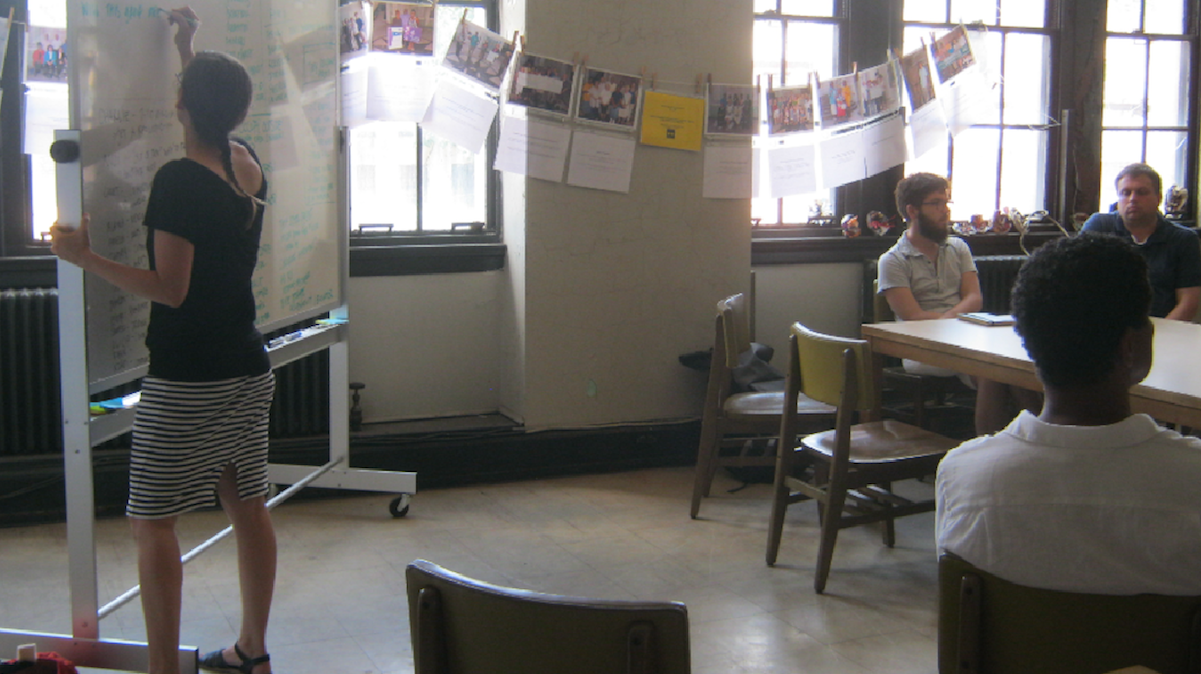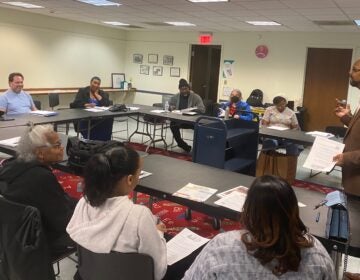Germantown’s ‘City Hall’ is officially closed to visitors but for how long?

Town Hall organizer Meredith Warner writes ideas from the group on a white board at Saturday's event. (Alaina Mabaso/for NewsWorks)
On Sunday, Germantown Town Hall closed its doors after hosting five weeks of visitors and neighborhood events through the Hidden City Festival.
But a Saturday afternoon meeting there, organized by project leaders Jacob Wick and Meredith Warner, gauged locals’ interest in keeping the neoclassic edifice open to the community.
The old town-hall building had been empty for more than 15 years when the Oakland, Cal.-based Wick partnered with Warner’s Germantown-based “Think Tank” group to include the site in the Hidden City festival.
Of time and space
For many locals, including about 15 people who attended Saturday’s meeting, five weeks was not enough time to enjoy the building.
To kickoff the discussion, Wick told attendees that “I wanted to call a meeting and talk about what a next step might be.”
Local architect Charlie McGloughlin then insisted that it was time to “throw down” and work on permanently re-opening the property.
“I’ve been inspired by seeing this place on the inside for the first time,” McGloughlin said.
Janet Boys, who has volunteered at Germantown First Presbyterian Church and Vernon Park, concurred.
“It’s silly to have a building like this and not use it,” she said.
Wick said there were two possible avenues for the discussion: A focus on keeping the building itself open, or launching a Germantown civic space elsewhere, like the one that has sprung up in the town hall over the last five weeks.
Attendees showed an overwhelming interest in the former.
Talk turns to money
Many at the meeting said they’d heard a complete renovation would cost anywhere from $7-10 million, after a purchase price ranging anywhere from a single dollar to $400,000, depending to whom you talk. However, no one knew the source of that figure.
Whatever the long-term cost, Germantown United Community Development Corporation board president Andy Trackman urged an “out-of-the-box” approach to salvaging the building.
Warner wondered whether it would be necessary to fix everything “from the ground up” before occupying the space in some way.
The group went on to discuss options like a piecemeal approach to repairs that could stretch over several years, the possibility of opening up just one section of the building (like the front rotunda), using the space on a limited basis for special events or focusing on the building’s exterior rather than the interior.
Putting up awnings for markets and events wouldn’t cost $10 million, Trackman noted.
“It’s easier for the community to adopt the outside” than involve big investors in an interior overhaul, attendee Pepon Osorio added.
Area-assessment discussion
The suggestion of a corporate assessment of the area, with the just-closed Germantown High School right across the street, drew fervent opposition.
“No vision for this building can forget about Germantown High School right now,” McGloughlin said.
To Trackman, “thinking outside the box” to preserve, renovate and open the building on the community’s terms would mean avoiding the corporate developer route, with its emphasis on financial returns.
He suggested looking to Fairmount’s Eastern State Penitentiary model. There, a non-profit organization has used tours and events to gradually raise enough money for its stabilization, opening more and more of its previously abandoned site to the public.
Historic designation
Like the Penitentiary, the town hall has been designated a historic building, which brings a combination of benefits and challenges to restoration efforts.
This historic standing could be an obstacle even to outside additions like awnings, the group realized.
Amelia Carter, who lives a few blocks away, noted that historic landmark status in itself is not usually a doorway to funding. On the other hand, attendee Beige Berryman explained that the historic status protects the building from demolition at any hands and adds value to the property.
The discussion also included the rotunda’s war memorial, which could perhaps draw funding from veterans’ groups to help keep that part of the building open.
Vision for the future
Despite the myriad funding, ownership, renovation and occupancy-regulation hurdles, the group was full of ideas for what Germantown Town Hall could eventually become.
Boys suggested converting it into co-housing units. Others called for a civic space, an eatery or coffee shop, classrooms, a home base for community volunteer groups, art galleries and studios, performance spaces, a co-op or some combination of it all.
After an hour and a half of brainstorming beneath the hall’s peeling paint, enthusiasm for forming a dedicated town hall committee ran high.
Several attendees raised their hands to volunteer their time or skills ranging from networking to graphic design. They decided they would meet again before the end of July, time and place to be announced.
“Keep the doors open,” McGloughlin said of the ultimate goal. “That’s number one.”
WHYY is your source for fact-based, in-depth journalism and information. As a nonprofit organization, we rely on financial support from readers like you. Please give today.




